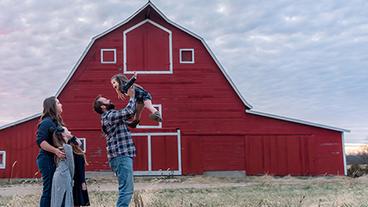You can designate your gift for a specific purpose or allow it to be used for MU Extension’s greatest needs. Every donation, regardless of size, is greatly appreciated and helps us fulfill our land-grant mission to improve agriculture, education, and economic development while helping Missourians live longer, healthier lives.
Make a secure gift online
Send a check
Download the appropriate giving form for your donation and mail it with your check to the address on the form.
Memorials and tributes
Donations to MU Extension or the Missouri 4-H Foundation may be designated as a tribute in honor of someone living, or in memory of someone that has died.
University of Missouri payroll deduction
University of Missouri employees can give to MU Extension or the Missouri 4-H Foundation through automatic payroll deductions. Use the online payroll deduction form, or print and complete this form and send to Mizzou Gift Processing, 407 Reynolds Alumni Center, Columbia, MO 65211.
Charitable IRA rollovers
For those aged 70 ½ or older, it is possible to make tax-favored charitable gifts from IRA accounts. A total of up to $100,000 can be transferred directly from IRAs to one or more qualified charities such as the University of Missouri or the Missouri 4-H Foundation. These donations are free from federal income tac each year. Amounts given in this way count toward required IRA minimum withdrawals. As your financial advisor if you are qualified to take a minimum distribution from your IRA.
If you are ready to make a charitable IRA rollover to MU Extension or the Missouri 4-H Foundation:
- Contact your IRA provider as soon as possible to initiate the rollover.
- Contact us to alert the MU Office of Gift Planning and Endowments or the Missouri 4-H Foundation to receive the rollover.
Non-cash gifts
Gifts of publicly traded stock, real estate, or other tangible and non-tangible property may allow you to receive a charitable tax deduction, while reducing or eliminating your capital gains tax. Contact us to learn more about the many ways to give to MU Extension or the Missouri 4-H Foundation based on your individual goals.
Planned gifts
Make a lasting impact on MU Extension or the Missouri 4-H Foundation with an estate gift. There are many options including life insurance, bequests through a will or trust, beneficiary designations, and life income arrangements. Contact us to learn more about how to include MU Extension or the Missouri 4-H Foundation in your estate plan.
We encourage you to tell us about your gift by completing an estate gift form. This ensures that we understand how you would like your gift to be used. This does not create a binding commitment. Any information you provide about your gift will be kept confidential.

Planning your gift for greatest benefit
Charitable gift tax planning used to focus on avoiding or reducing estate taxes. Today's planning is about making gifts without increasing taxable income. Your tax-deductible contributions of cash and other assets may help you manage how much income tax you pay. Contact us to learn how you may be able to give a larger gift that will have even greater impact and lower your taxes.

Make a gift of publicly-traded stock
You can make a gift of publicly-traded stock and reduce or eliminate your capital gains tax. Over time, publicly traded stock may increase in value, or appreciate. The appreciation in stock that is held for more than 12 months is taxable as capital gain. If transferred directly to MU Extension without selling, the full value of the stock gift is deductible as a charitable contribution. For example, if 20 shares of xyz corporation was bought a number of years ago for $10 per share, and it is now worth $50 per share, the capital gain would be $40 per share. If the 20 shares were sold, $800 would be taxable at the capital gains rate. Instead, if the 20 shares were given to MU Extension, the donor would make a gift of $1,000 and receive a charitable deduction for the full amount of the gift. Always consult your tax advisor before making a charitable contribution of appreciated assets.

Making gifts from retirement accounts
If you are 70½ or older, your Individual Retriement Account is a great way to give without triggering taxable income. You can make qualified distributions directly to MU Extension up to $100,000 each year. These will not count as taxable income and can count as Required Minimum Distributions that some IRA owners must pay. You may make MU Extension a beneficiary of all or part of your retirement account. Contact the Advancement office to learn how to designate a gift for MU Extension.

Make a gift of grain
Charitable gifts of grain commodities can be donated at any time but work best when donated in the year following the year they are grown. Under this method, the expenses of the crop are deductible in the year in which the crop is grown. This give the crop a $0 cost-basis in the following year. By donating the crop directly to the charity, no income tax or self-employment taxes are payable. In addition, there is no charitable deduction.
A gift made in this manner should result in tax savings of at least $300 per $1,000 gift in federal and state taxes for those in the 15 percent tax bracket and nearly $400 for those in the 25 percent bracket, as compared to savings of $150 to $250 had the crop been sold for cash and then a check written for the $1,000 gift.
Always consult your tax advisor before assuming a specific tax advantage is applicable.

Make a gift of real estate
A donation of real estate may allow you to: receive a charitable tax deduction, reduce or eliminate capital gains tax, eliminate gift tax on transfer, reduce size of your taxable estate, convert non-income asset into income-producing asset, and relieve responsibilities and costs of upkeep.
Example: In the early 1980's, the donor purchased five acres of agricultural real estate on the edge of town for $150,000. He kept the property maintained and taxes current, but never made any major improvements to turn it into an income-producing property. Nearing retirement, the donor considered how he might use the property to supplement his retirement income. With the help of an advisor, he gave the property to a university through a trust arrangement that allowed the property to be sold and create an annual trust income for the donor for the rest of his and his wife's lives. A portion of the value of the trust was considered a gift allowing the donor to use a sizeable charitable deduction for that year's taxes. In addition, since the donor retains an income benefit from the trust created from the sale of the real estate, the capital gains are spread over the life of the trust making the payment of the capital gains taxes manageable. Each year, the donor receives a payment of five percent of the value of the $1.2 million dollar trust created from a non-income producing piece of real estate.